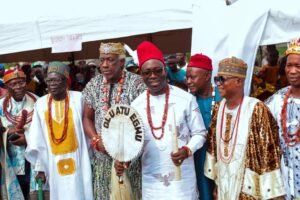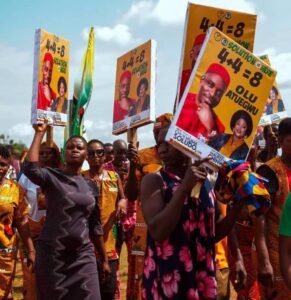
Governor Chukwuma Charles Soludo’s address at Otuocha Township Stadium on Saturday showcased several key strengths that position him favorably for the upcoming gubernatorial election. His speech revealed a leader who has successfully balanced governance with grassroots connection while maintaining strong institutional relationships.

Soludo’s recounting of how he earned the “Oluatuegwu” title demonstrates genuine leadership authenticity. The organic emergence of this title from a roadside encounter—where a woman observed him working in casual clothes during project inspections—speaks to a hands-on leadership approach that resonates with ordinary citizens. The subsequent formalization of this street-coined title by traditional rulers shows how his practical governance style has gained institutional recognition. This narrative effectively bridges the gap between elite political leadership and grassroots appeal, suggesting a leader who remains accessible despite holding high office.
Building on this authentic foundation, the governor’s emphasis on his administration’s continued focus on governance over campaigning presents a compelling political narrative. By stating he hasn’t yet formed a campaign committee because he’s “working 24/7,” Soludo positions himself as a leader prioritizing service delivery over political maneuvering. This approach serves multiple strategic purposes: it demonstrates dedication to his current mandate while subtly suggesting confidence in his re-election prospects based on performance rather than campaign promises.
What makes this positioning particularly effective is how it connects to Soludo’s detailed recounting of his historical relationship with Anambra North traditional rulers. His reference to the October 17, 2020 meeting where these rulers first endorsed his gubernatorial ambition reveals sophisticated political networking and institutional memory. The immediate commencement of development projects in Anambra North upon assuming office demonstrates both political wisdom and genuine commitment to inclusive governance across senatorial zones. These deep institutional relationships provide the stable foundation upon which his governance-first approach can credibly rest.
Similarly strategic is the governor’s defense of Anambra’s zoning system, which reflects political maturity and institutional thinking. By framing opposition to his re-election as attempts to “truncate the zoning system,” he positions himself as a defender of established democratic principles rather than just a candidate seeking personal advancement. This argument appeals to fairness and established precedent while potentially isolating opponents as disruptors of agreed-upon political arrangements, seamlessly connecting his personal ambitions with broader systemic stability.
Perhaps most impressive, however, is the organic nature of the endorsement rally itself. With over 10,000 attendees and stakeholders contributing their own resources, the event demonstrates genuine popular support that cannot be manufactured. Soludo’s acknowledgment that he contributed “not one naira” to the event while stakeholders “across all political parties came together” suggests cross-party appeal and authentic grassroots mobilization. This type of organic support often translates into electoral success and indicates strong name recognition and approval ratings that extend beyond partisan boundaries.
Reinforcing this grassroots appeal are the governor’s specific references to completed projects—roads from Umueze Anam to Nzam, infrastructure in Okpoko, and the transformation of Nwafor Orizu College of Education. His mention of youth empowerment programs, with 5,000 already supported and 8,700 more planned, demonstrates a systematic approach to human development. These concrete achievements provide tangible evidence of performance that validates the enthusiastic crowd response and offers a strong foundation for re-election messaging based on delivered results rather than promises.
Equally noteworthy is Soludo’s seamless transition between English and Igbo, along with his explanation of cultural concepts for broader audiences. This linguistic competence shows deep cultural rootedness while maintaining accessibility, and his comfort with local expressions and traditional protocols demonstrates authentic cultural connection that resonates with voters. The governor’s cultural fluency enhances his credibility when making bold electoral projections, such as winning “326/326 wards” and questioning “which polling unit are we going to lose.”
Such confident predictions reflect either strong internal polling data or exceptional confidence in his administration’s performance. These bold statements can create momentum and discourage opposition while energizing supporters, but they gain credibility precisely because they emerge from a leader who has demonstrated both cultural authenticity and concrete achievements.
Furthermore, Soludo’s inclusive approach to party leadership adds another dimension to his political strength. By describing APGA as “the father of progressives in Anambra” and welcoming other parties to join the progressive movement, he demonstrates inclusive leadership that could attract cross-party support. This approach suggests confidence in his political philosophy and openness to broad-based governance, which aligns perfectly with the cross-party nature of the endorsement rally itself.
Throughout his address, the governor maintained strategic restraint in addressing opposition candidates. Rather than engaging in negative campaigning, he acknowledged them as friends while questioning their motivations, focusing instead on systemic arguments about zoning and performance records. This measured response shows political maturity and maintains dignity while making his case, suggesting a leader secure enough in his position to avoid the desperate tactics often associated with vulnerable incumbents.
In conclusion, Governor Soludo’s speech reveals a leader who has successfully combined effective governance with masterful political positioning. His organic grassroots support, deep institutional relationships, concrete achievements, and strategic messaging create a formidable foundation for re-election. The enthusiastic endorsement from Anambra North stakeholders suggests his administration has successfully maintained the coalition that brought him to power while expanding appeal across party lines. Most significantly, the governor’s confidence in delaying formal campaign activities while focusing on governance reflects either exceptional political security or strategic brilliance in maintaining momentum through performance rather than promises—a rare luxury in contemporary Nigerian politics that speaks to the strength of his position.



